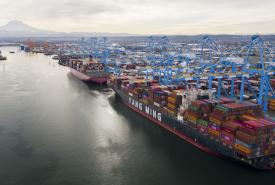Speaking on a panel devoted to “Robotics & Automation in Container Terminals” at the recent TOC Europe conference in Hamburg, Alex Duca, Head of Terminal Design and Automation at APM Terminals outlined the concept of container terminal design by module and the importance of integrated automation and information sharing across every aspect of terminal cargo handling to make operations safer and better.
Mr Duca said: “The biggest business opportunity is in retrofitting existing terminals with the automation of key processes to enhance our current operational performance. This is where you can evaluate some of the specific modules within a container terminal to see which processes can be improved through automation.”
With larger vessels entering into service, as well as the organic growth of global trade, pressure on terminal operations to avoid congestion during peak cargo-handling periods of high activity has become an increasingly important aspect of future operations planning.
Mr Duca continues: “What we want is a more integrated container terminal encompassing control systems and equipment functions, instead of today’s fragmented activity container terminal; we need to make better use of equipment sensors and systems that combine with logistical information provided by terminal systems if we are to achieve automation’s true potential.”
Container volume handled by the world’s ports is projected to reach approximately 720 million TEU in 2016, roughly double the global container volume of just 13 years ago.
Physical constraints on the number of cranes which can work any particular vessel, even one as large as 20,000 TEU capacity, and the need to transport containers out of the terminal without congestion or increased safety risks to the terminal workforce are driving the next phase of terminal design, development and operations in which data sharing at each aspect of cargo handling will enable new demands for container handling and productivity to be met.
PTI recently hosted its own conference, in which the topic of container terminal automation and data sharing were discussed.
Watch the experts debate some key issues with regards to terminal automation and training:
Dr Oscar Pernia of Navis believes that technology is not a problem in the context of container terminals and that technical integration remains fundamental.
Read a recent paper from Dr Pernia on data alchemy and smart connected terminals
Duca concluded: “Terminals need to keep pace with volume growth and vessel growth, and the clear solution is integrated automation of terminal operations processes.”









